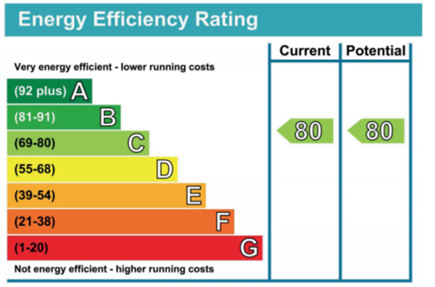New Energy Performance Regulations – What commercial landlords need to be aware of and importantly prepared for.
Commercial landlords have for some time been subject to the requirements of the Energy Efficiency (Private Rented Property) (England and Wales) Regulations 2015, commonly known as the MEES Regulations. These regulations encouraged landlords of non-residential properties to improve the energy efficiency of their properties as required by the Energy Act 2011 but from the 1st of April 2023 its all change.
Energy efficiency ratings are measured using a scale known as Energy Performance Certificate rating (EPC rating) and the bands are as follows:
The Current position on the EPC regulations
Since 1st April 2018, a landlord has been unable to let or ret-let any commercial property that has an EPC rating lower than E and any properties with an EPC rating of F or G being treated as sub-standard.
What is changing?
From 1st April 2023, Commercial Landlords, will need to ensure that their properties are graded ‘E’ or higher in order to continue to let a commercial property unless there is a legitimate reason for the property not to be graded E or above.
Legitimate reasons include:
- Where the property remains below grade E despite all the relevant energy efficiency improvements being made or where it is not possible for any improvements to be made.
- A valid exemption applies. These include:
- Where the recommended improvements would cost more than the savings on energy bills over 7 years
- Where recommended wall installations would have a negative impact on the structure of the property
- Where it is not possible to get consent from either the tenant or a third party such as a Local Authority, to carry out the work
- New landlords have a six-month exemption
- Where there is evidence to show that the relevant works would devalue the property by 5% or more
It is important to note that exemptions are not automatic and any landlord seeking to rely on an exemption must register with the PRS Exemption Register before the tenancy is entered into. If an exemption is granted, they are only valid for five years and cannot be transferred to a new landlord following the sale of a property.
There is also a very small list of properties that do not require an EPC, but it is the responsibility of the landlord to ensure that they comply with the regulations or are exempt.
Penalties for non-compliance
The repercussions for breaching the regulations include a financial penalty which could be a fixed sum or a percentage of the rateable value of the property up to a maximum of £150,000 or a publication penalty where the details of the breach are entered on a public register.
While this comes at a challenging time for many commercial landlords still adjusting to the effects of increased working from home it is important to recognise that these changes are designed to improve the energy efficient of commercial properties with the ultimate goal of securing a greener future for us all.
If you are a commercial property landlord and would like to speak to the team or you are concerned about your EPC rating, please get in touch the team are here to help. Call Jenna Allsop on 01225 750090 or email jenna.allsop@mogersdrewett.com.

